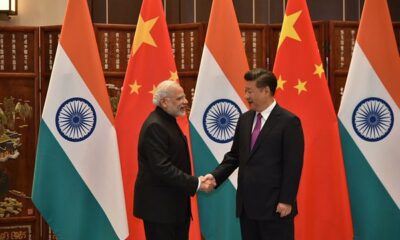Global Issues
Journalism Career Graveyard: The BBC And Its West Africa Problem -By David Hundeyin
Even more incredibly, she had supervised the hiring of one Hamet Fall Diagne, a close friend and former roommate of her husband, as a Senior Broadcast Journalist. Mr. Diagne, by the way, had no formal qualifications and his greatest career highlight up until that point was directing the first ever web series in Senegal to be filmed entirely on a smartphone.

The first thing one learns in this line of business is the maxim “There is never just one cockroach.” Journalists, private investigators and short sellers are taught to live by this saying as they hunt for information about organisations that do not always appreciate exposure. In his book “Money Men: A Hot Startup, a Billion Dollar Fraud, a Fight for the Truth,” Financial Times journalist Dan McCrum explains how chasing down the single “cockroach” of accounting fraud at Wirecard ballooned in front of his eyes, ultimately turning into a story that involved air gapped computers, secret document pickups in Singapore, a cross-border Russian spy operation, Libyan mercenaries and ultimately a €24bn corporate collapse that rocked Europe’s largest economy.
The problem for a journalist interested in the inner working of BBC West Africa, is an altogether different one. Rather than struggle to identify a single cockroach and then follow its trail to find more cockroaches, one is immediately confronted with what looks like several cockroaches. Nigeria’s media space is not a very big one, and there is never a shortage of whispers about scandals at that organisation. Upon closer inspection however, these “cockroaches” have almost inevitably turned out to be mere hints of cockroach activity. Lots of rumour but little substance. All icing and no cake. Lots of flavour, but little food.
“This person was employed because they are so-and-so’s family member.” “So and so are publicly having an affair even though one reports directly to the other. They even audibly have sex in the office.” “So and so had sex with that and the other to get into a BBC production without having any formal qualifications.” “HR at BBC West Africa is nonexistent.” “So and so is such a bad office bully that they made so and so resign and quit journalism for good.” The gossip and rumours come thick and fast, but invariably, when it is time for anyone to provide documentation or go on record, the are-they-are-they-not-cockroaches disappear, and nothing is ever established.
This all started to change on Sunday, December 13, 2020, when Ogechi Obidiebube, a broadcast journalist working at the BBC Lagos Bureau decided that she had had enough. Over the course of 2 alcohol-fueled hours, she poured out her angst, referencing the things she claimed to have gone through in the hands of her superiors and the the BBC’s notoriously cavernous hierarchy. Unfortunately, the episode did not end well for her, culminating in a livestreamed suicide attempt that left her in hospital for the next 2 months. The BBC subsequently fired her, and to all intents and purposes, that was the end of that.
What the decision makers in Lagos, Dakar and London did not know was that – ill advised as it might have seemed at the time – Ogechi’s self-immolating act of defiance had started a fire in the minds of her colleagues in Lagos, Abuja and Dakar. Previously, under strict instruction from the organisation, they would never dare to speak publicly about their experiences – even after leaving the BBC. Now however, having witnessed the near-death of their colleague, they were finally ready to do away with their silence. For the first time ever, current and former BBC Africa employees and contractors started to reach out in numbers to those they believed could tell their stories. I was one of such people.
The following 3 stories, taken from extensive testimonies and documentation provided by BBC Africa staff in Dakar, Abuja and Lagos, are the culmination of nearly 2 years of research and interviews. On an individual basis, they paint the picture of an organisation with huge gaps in corporate governance and a massive HR malpractice problem. Taken from a wider angle, they form part of the bigger picture of a dysfunctional British public institution that according to some, shouldn’t even exist in its current form. While it suffers from the same intractable internal governance problems at home, nowhere are these failings more greatly magnified than at its weakly-regulated outposts in West Africa.
Our journey begins in Dakar, Senegal.
The American Editor From Hell
“Since her inception as BBC Afrique Editor on October 8th 2019, an alarming number of journalists have left the BBC in order to preserve their mental health. She thrives on resorting to bullying and harassment to force people she dislikes out of the BBC [especially] any journalist who generally does not feel indebted to her.”
Zaïnabou Mohamed Hassane was a freelance journalist who started on the way to what she thought was living her dream in 2019. Ahead of the presidential election in Senegal, the BBC’s Dakar bureau, which was then without an office head, took her on to cover the polls as a freelancer. She later got the opportunity to apply for a full time role at the bureau and she took it. After making it past all the application stages, she received an invitation to a final interview round to be conducted by a board made up of 3 people – the new BBC Afrique Editor, Anne Look Thiam and Senior Broadcast Journalists Godlove Kamawa and Claude Foly.
Describing what happened next, Zainab said:
So, come the day of the interview, I arrive and I was waiting in the newsroom for my turn. When the time came, it was Mrs. Anne who came to call me herself. Just before entering the interview room, she asked me a question which had no connection with the interview. “Were you the one who worked at Ouest TV?” I said yes. “Do you know Coumba?” I answered yes. And there, alas, it clicked in my head, I said it’s over. I’m not going to succeed in this interview, everything is sealed. I specify that Mrs. Anne saw me every day in the editorial office and knew what I was doing as work for the elections and she never stopped me to ask me if I knew the lady in question. It was on the day of the interview that she asked me about her. Then 10 days later, I got the answer that I was not selected. I asked myself the question several times: why did Mrs. Anne ask me that day if I knew this person? What did that have to do with the interview? There were a lot of questions running through my head. Did I fail because I was not up to it? Or is it simply related to Anne’s question about this Coumba? Who knows.
Unknown to her, what she had stumbled into was the epicentre of the Dakar Bureau’s corporate governance black hole. It would later emerge that “Coumba” was not only one of Anne’s closest friends, but was in fact married to Ouzin Ndiaye, a close friend of Anne’s husband, Charles Thiam. And – get this – Anne had supervised the hiring of Ouzin as a video journalist at the Dakar Bureau. Conflict of interest be damned.
Even more incredibly, she had supervised the hiring of one Hamet Fall Diagne, a close friend and former roommate of her husband, as a Senior Broadcast Journalist. Mr. Diagne, by the way, had no formal qualifications and his greatest career highlight up until that point was directing the first ever web series in Senegal to be filmed entirely on a smartphone.
Somehow, he went directly from this to becoming an SBJ at one of the world’s largest media organisations, and no questions were asked. To put this in its truly ridiculous perspective, Ruona Meyer who headlined the Emmy-nominated 2018 BBC Africa Eye “Sweet Sweet Codeine” documentary was a BBC Africa SBJ at the time. Yet despite clearly being at a more advanced career stage and at a different skill level to Mr. Diagne, they would both apparently share the same job title and seniority level in the same region of the same organisation.
If this sounds suspiciously like the sort of corporate governance shenanigans and HR malpractice that abounds at thousands of mom-and-pop SMEs from Dakar to Ouagadougou, that’s because that is exactly what you are looking at. At the BBC Dakar Bureau, you see, Anne Look Thiam’s word is law. Zainab would later find out that because she had a preexisting feud with Anne’s good friend Coumba, she was never going to get the job. From the moment she confirmed that she was Zainab from Ouest TV, the same one who had beef with Anne’s friend, that door was already closed.
Corporate governance and conflict of interest be damned.
The following comprehensive complaint about Anne Look-Thiam’s Jean-Bédel Bokassa tribute act was submitted earlier this year. In it, Mrs. Look-Thiam’s habit of descending into screaming fits and ordering staff around at the Dakar bureau were detailed. There are no prizes for guessing what the BBC did with this information. The same thing it always does – nothing.
Read full article: Source



















